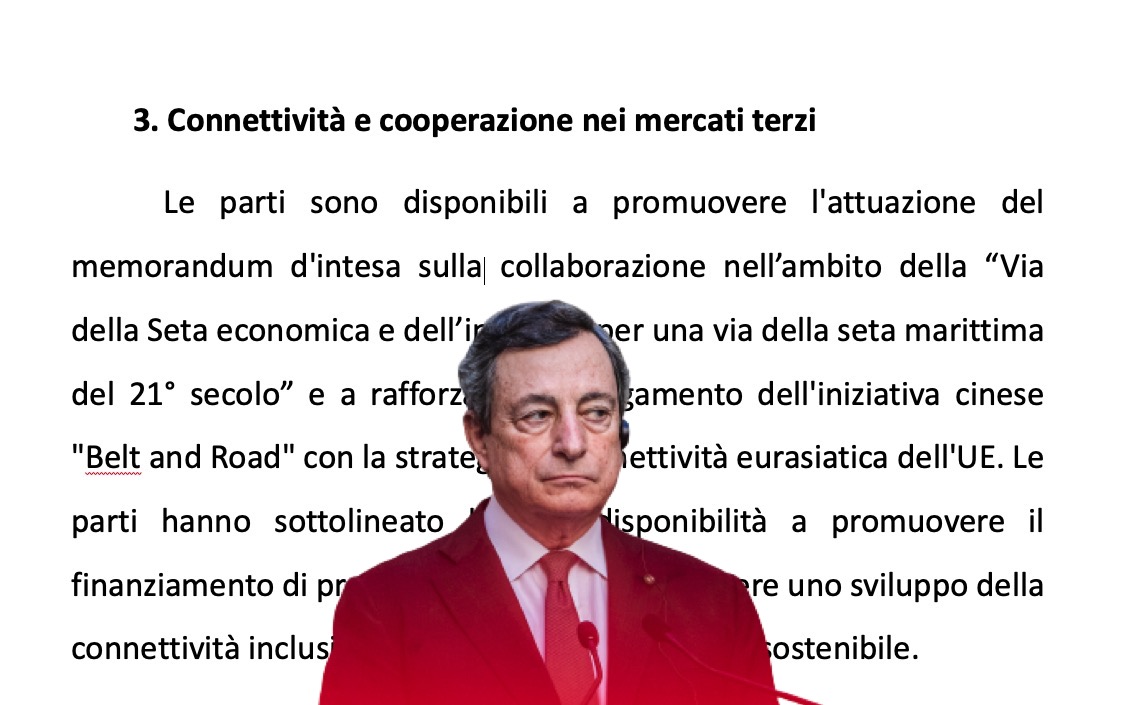During the G7, Italian PM Draghi stated his intent to carefully examine his country’s Silk Road agreement. But Formiche.net was able to read a working document of the Ministry of Foreign Affairs in view of his bilateral meeting with Chinese counterpart Li Keqiang, which speaks of “promoting the implementation of the Memorandum of Understanding” signed in 2019. Our insight into the leak
A document from the Italian Foreign Ministry in preparation for an upcoming Italy-China summit, of which Formiche.net has come into possession, raises new questions about Rome’s posture regarding the Belt and Road Initiative.
Let’s take a step back. At the G7 in Carbis Bay and at the NATO summit in Brussels, Prime Minister Mario Draghi affirmed Italy’s Euro-Atlantic positioning and unequivocally sided with allies to develop concrete responses to the geopolitical challenges posed by China. In particular, a B3W (Build Back Better World) plan will guide the G7’s actions in offering the developing world an alternative to China’s BRI. Palazzo Chigi’s tenant announced a careful examination of the Memorandum of Understanding signed in March 2019, making Italy the first (and only) of the Seven to join the initiative launched in 2013 by Chinese President Xi Jinping.
It is in this context the document viewed by Formiche.net emerges: elaborated by Beijing and under final review at Italy’s Foreign Ministry, led since a few weeks by its new Secretary-General Ettore Sequi, former Head of Cabinet of Minister Luigi Di Maio and former Ambassador to China.
Entitled “Three-year action plan for strengthened cooperation (2021-2023)”, it follows up on similar plans signed over the past years and under different governments. The document, which we believe has not yet arrived at Palazzo Chigi, contains conclusions on the results of a bilateral meeting between Prime Minister Draghi and Li Keqiang, Prime Minister of the People’s Republic of China, which should take place in the coming weeks, ahead of the G20 where Xi Jinping is expected to be present. It appears the document has been circulating between the Foreign Ministries of the two countries for several months, possibly already under former PM Giuseppe Conte, who signed the MoU in 2019. It certainly reflects Chinese Foreign Minister Wang Yi’s appeal to Rome during in flash visit in August last year.
The proposal for the new three-year plan covers many fields, aiming to “prioritize cooperation in the following sectors: economy, trade and investment, finance, connectivity and cooperation in third markets, environment and sustainable development, health and medicine, science and technology, aerospace, cultural exchanges and sport”.
The document to be proposed by the MFA to Palazzo Chigi resounds with China’s win-win language, completely overturning the public stance adopted by Prime Minister Draghi in recent days. It reads: “The parties are willing to promote the implementation of the Memorandum of Understanding on cooperation on the ‘Economic Silk Road and the 21st Century Maritime Silk Road Initiative’, and to strengthen the Chinese ‘Belt and Road’ initiative with the EU’s Eurasian connectivity strategy.” It also evokes the intention to “create effective cooperation at every level to contribute to the development of relationships between China and the European Union.”
And further: “The parties will encourage exchanges of scientific researchers, collaboration between universities, scientific research institutes and companies in the field of scientific and technological innovation” and “support the development of pragmatic and transparent cooperation in the field of science and space technology”.
Brief mention also of the Comprehensive Agreement on Investment (CAI): “Parties agree […]the future signing of the EU-China Global Investment Agreement will provide greater opportunities for collaboration.”
Notoriously lacking is any trace of human rights, a main theme at the recent G7. Furthermore, whereas calls for a diplomatic boycott are increasingly fueling debate in the United States (including Speaker of the House Nancy Pelosi) and other allied countries over the grave human rights violations in China (Xinjiang, but not only), Italy would commit to supporting the organization of “events to promote the Beijing 2022 Winter Olympics”.
In some parts, the documents’ tone and commitments are softened by the edits of Italy’s MFA with respect to Chinese wishes. For example, the commitment to “jointly build the Chinese ‘Belt and Road’ Initiative” has been replaced with the previously mentioned commitment to promoting its implementation. Some chapters also appear to tone down on the more specific Action Plan towards 2025, drawn up at the end of 2019 by the Directorate General for the Country System of the Foreign Ministry, which entered into detail on scientific and technological cooperation.
However, everything seems to suggest to Palazzo Chigi to fully continue the Silk Road route, a direction Prime Minister Draghi clearly seemed to want to avoid.
* Laura Harth is coordinator at Global Committee for the Rule of Law Marco Pannella








